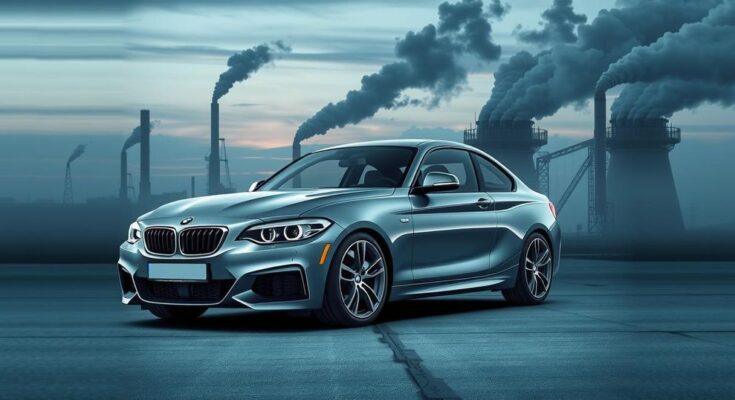BMW AG predicts carmaking profits will be below long-term goals due to trade tensions and declining sales in China, expecting a margin of 5-7% this year. The stock has decreased significantly, and net profits fell 37% in 2024 largely due to a recall. The company plans to introduce new EVs and increase North American manufacturing to mitigate impact from tariffs, while growth projections amid challenges in China face skepticism from analysts.
BMW AG anticipates that its carmaking profits will significantly fall short of its long-term objectives due to increased trade tensions between the United States and Europe, alongside declining sales in China. The company forecasts an automaking margin between 5% and 7% for the current year, after recording a decrease to 6.3% in 2024, marking the lowest margin in four years, while its target remains above 8%.
The company’s stock fell up to 4.5% recently, showing a notable decline of over 20% in the past year. The automotive manufacturer faces intense competition from local electric vehicle (EV) producers in China, particularly BYD Co., complicating its market stance in one of its critical markets. Furthermore, tariffs imposed in the US and Europe are projected to result in an estimated cost of around €1 billion this year, as stated by Chief Executive Officer Oliver Zipse during an interview with Bloomberg Television.
In an effort to regain market share, BMW plans to launch its Neue Klasse, a new line of electric vehicles, later this year. The company aims to introduce 40 new and updated vehicles across all drivetrain variants by 2027. “We have growth ambitions because we have strong products,” Zipse remarked, expressing optimism about 2025 despite current political challenges.
The impact of US tariffs is already being felt by BMW’s manufacturing operations in San Luis Potosi, Mexico. Although delays in the implementation of tariffs were granted to companies complying with the USMCA trade deal, BMW does not meet local content requirements. In response to these challenges, the company is investigating increasing its manufacturing presence in North America to adhere to the agreement, with planned investments in the US and Mexico.
Disclaimer exists surrounding the possibility of increased tariffs on vehicles imported from Europe, where BMW manufactures its premium sedan models. Zipse expressed confidence that not all tariffs will remain in place indefinitely, noting that “we are quite safe” with the anticipated €1 billion cost.
Consequently, BMW’s overall net profit saw a steep decline of approximately 37% to €7.68 billion (around $8.3 billion) in 2024, primarily impacted by a recall linked to braking systems from Continental AG. Global car sales fell by 4% last year, particularly hindered by weakened performance in China, where deliveries of the BMW brand and Mini dropped by 13.4%. In comparison, other automotive giants, such as Mercedes-Benz and Porsche, also experienced declines in the Chinese market, registering 7% and 28%, respectively.
Despite the challenges, BMW projects a slight increase in car sales this year, driven by stabilizing inflation and potential interest rate cuts. However, concerns have been raised regarding the assumption that growth in Europe and the US will adequately compensate for potential declines in China. Citi analyst Harald Hendrikse pointed out that this could be an overly optimistic perspective.
In conclusion, BMW AG is contending with significant challenges this year, including tariffs and softening sales in China, which are projected to adversely affect profitability and hinder the achievement of long-term targets. Despite these challenges, the company remains optimistic about future growth, driven by the introduction of new electric vehicle models and strategic business adjustments. However, analysts caution that expectations for growth in key markets may be overly ambitious, given the current economic climate.
Original Source: www.business-standard.com




